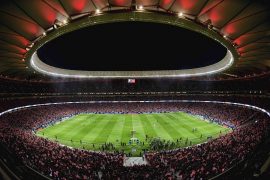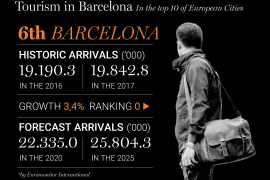After 25 years of growing success, of commitment to the musical and technological avant-garde and championing independence, Sónar is no longer an independent festival. At least, it is less independent than before. At the beginning of July, it was known that an US investment fund took control of the shareholding of Advance Music, the company that organizes it since its creation in 1994. It is the last case of capital inflow from investment funds in the local industry of festivals and companies dedicated to leisure, but it is not the only one.
 Last year, the Pachá emporium (started in Sitges, although indelibly associated with Ibiza) passed into the hands of Trilantic Capital Partners, an US investment fund that also holds positions in other Spanish companies, such as Talgo or Euskaltel.
Last year, the Pachá emporium (started in Sitges, although indelibly associated with Ibiza) passed into the hands of Trilantic Capital Partners, an US investment fund that also holds positions in other Spanish companies, such as Talgo or Euskaltel.
At the end of June, it was also announced that Primavera Sound, that this year beat its record attendance with more than 220,000 people, opened its shareholding to the US investment fund The Yucaipa Companies, a fund manager led by billionaire Ronald Burkle, shareholder of reference of companies such as Golden State Foods, Dominick’s, Fred Meyer or Soho House (the international chain of club-hotels also established in Barcelona). Although the figures have not transcended, the organization of the festival assures that the operation consisted of a minority acquisition that grants the investor two seats on the board of directors but guarantees the identity and independence of the festival.
The acquisition of part of the shares of Sónar came shortly before its most successful edition, which exceeded 126,000 attendees, although the news was made public at the beginning of July. Neither the festival management (formed by Ricard Robles, Sergi Caballero and Enric Palau) nor the investment firm Providence Equity Partners (that boasts about managing funds of 57,000 million dollars) wanted to make public the amount or the percentage of business, but it is suggested that the fund would control between 60 and 80% of the capital, for a cost that would range between 15 and 20 million euros. This type of operation almost always contemplates a progressive control of the company that is acquired, after a transitory stage in which the original managers maintain control and direction. The silence on the part of Sónar -regarding the operation- has been stony also after the direct enquire from The New Barcelona Post. No comment.
Entertainment sector -especially the one related to products that require the physical presence of the consumer and offer an experience as well as a product- are rapidly approaching a process of globalization similar to that which previously affected other sectors
The operation by Providence has materialized through the subsidiary Superestruct. The CEO of Superstruct is James Barton, founder of the Creamfields festival, and in the management team of the fund there are positions that have been linked to companies and entities such as Live Nation, Cirque du Soleil, Manchester United or Inter Milan. Some connections that clearly outline how the entertainment sector -especially the one related to products that require the physical presence of the consumer and offer an experience as well as a product- are rapidly approaching a process of globalization similar to that which previously affected other sectors. In a brief statement, Barton confirmed the entry into Sónar without giving details: “Advanced Music has an enviable track record in the live entertainment industry. We have long admired their events, especially Sónar and Sónar+D, and we trust that this collaboration will allow our platform to benefit from unique synergies and strengthen our position in the market. We look forward to working with the founders of Advanced Music to develop the full potential of this union”.
Superstruct Entertainment also acquired in 2017 the Hungarian festival Sziget and has entered the company Elrow, dedicated to the organization of parties and whose headquarters are also in Barcelona. Elrow is already immersed in a vertiginous process of growth, and sells show-parties that include animation, decoration and music programming in practically the whole world, with numbers in growth that foresee tripling the income in just one year.
Thus, Barcelona demonstrates that it has managed to create in the last two decades an ecosystem of first level companies in the sector of entertainment and experiential entertainment. Companies that have created a dynamic offer, able to attract the attention of international investors. The next challenge for these brands is to grow on a global scale without losing their original identity or their link with the city. For the founders, the dream of any entrepreneur has come true: to receive an injection of capital that allows an uncertain growth and expansion through their own means, in addition to converting them from small entrepreneurs -who mostly started from the base of the business- into winners. Not only in prestige, also monetarily.



















